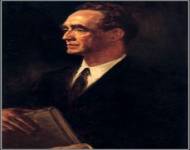Early Life
Frank Murphy was born on April 13, 1890 in Michigan. Murphy’s father was an attorney. He graduated from the University of Michigan Law School in 1914. After graduating, he enlisted in the Army and went on to serve in World War I where he achieved the rank of Captain.
Career
When Murphy returned home from World War I, he went back to Michigan and became the Eastern District’s assistant U.S. attorney. Murphy held this position for a number of years before he became a judge. He was elected to Detroit’s Recorder Court, which was a state court reserved for all felonies committed in Detroit along with all traffic and ordinance issues.
In 1930, Murphy was elected as the mayor of Detroit. Murphy was the mayor during the Great Depression and he was instrumental in helping the city survive. Murphy was not re-elected and in 1933 he was chosen by President Roosevelt to be the Governor General of the Philippines. Murphy’s position was later renamed as the U.S. High Commissioner in the Philippines. While he served in these positions, Murphy was instrumental in helping the Filipino people gain their independence. He also helped women gain the right to vote.
After returning home from the Philippines, Murphy was elected as the Governor of Michigan in 1937. He served one two-year term as Governor.
Murphy was appointed as U.S. Attorney General in 1939 by President Roosevelt. While he was Attorney General he established the Civil Rights Division of the Justice Department.
Supreme Court
President Roosevelt nominated Murphy for a seat on the Supreme Court in 1940. Murphy was nominated to replace Pierce Butler, who had been the only representative of the Catholic faith on the Court. President Roosevelt nominated Murphy, who was also Catholic, as a replacement for this role.
Murphy was known as a strong supporter of civil rights and in West Virginia State Board of Education v. Barnette, he granted students the right to refuse to salute the American flag for religious reasons. Murphy’s decision in West Virginia State Board went against his decision four years earlier in Minersville School District v. Gobitis (1940) when Murphy voted that saluting the American flag in school could be made mandatory.
During World War II when the Court decided Korematsu v. United States, a case involving the internment of Japanese Americans during the War, Murphy wrote a passionate dissent when the majority ruled the internment was constitutional. In that dissent, Murphy wrote that the majority’s decision was a “legalization of racism.” Korematsu v. United States, 323 U.S. 214, 242 (1944).
In 1946, Murphy wrote the majority opinion for SEC v. W.J. Howey, Co. in which he articulated a test for determining what was considered to be an “investment contract” under the Securities Act of 1933. This test would later become known as the “Howey” test. SEC v. W. J. Howey Co., 328 U.S. 293 (1946).
Murphy never officially resigned from the court, as he remained on the Court until his death.
Later years
Murphy died on July 17, 1949 in Michigan. He was 59.








